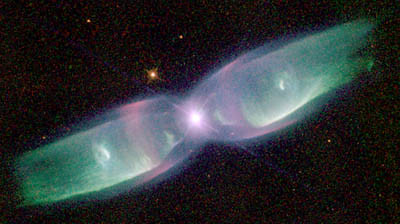
In an effort to explore the forces that created the universe, scientists at CERN started operation of the Large Hadron Collider (LHC) today, despite concerns from some physicists and cosmologists that the experiments conducted in the LHC could cause reactions leading to the destruction of the planet.
Cosmologist Luis Sancho, who was initially behind the project, commented in Harpers:
Unfortunately, theoretical calculations show that the LHC could produce two kinds of dark matter—black holes and strange, ultradense quark matter—that are extremely dangerous, as both have been theoretically proven to swallow in a chain reaction the entirety of Earth. Thus, a cosmological bomb billions of times more powerful than the atomic bomb might be created at the European Organization for Nuclear Research.
The exact probability of a runaway reaction that converts Earth into dark matter is unknown. The minimal risk as calculated by CERN allows for a 1 to 10 percent chance of extinguishing Earth. In the insurance business, a potential catastrophe’s “death toll” is calculated by multiplying the number of possible victims by the probability that the event will occur. A similar calculation (6,000,000,000 x 1–10%) shows that the LHC experiment would be, technically, the largest holocaust in history. It would also be the biggest environmental crime in history, far more harmful than global warming, as it would mean the destruction of all life-forms on the planet. Since the production of dark matter is neither necessary for the advancement of science nor safe for mankind, the LHC should be forbidden to operate. As we close Chernobyl-like plants for security reasons and forbid the reproduction of the Ebola virus in an open environment (though some specialized virologists would like to study it for research purposes), so should we forbid the reproduction of free, uncontrolled dark matter, even if its theorists would like to study it at CERN. The production of dark matter will not be a “new discovery,” nor will it advance the study of physics. Furthermore, CERN’s researchers will not be awarded a Nobel Prize—the ultimate goal of all experimentalists—if Earth is consumed.
The LHC started without incident today, leading some wag at The Independent to proclaim, You're reading this, so the world hasn't ended.... Of course, the initial startup of the particle accelerator only involves a stream of sub-atomic particles moving in a single direction through the 27-kilometer circular tunnel. The particle collisions begin when they launch a stream in the opposite direction and those collisions are expected to briefly reproduce conditions that existed when the universe was conceived.
Efforts to halt the operation of the LHC through lawsuits until safety concerns are addressed have so far been unsuccessful. The Citizens Against The Large Hadron Collider Web site states:
Some experts fear that the risk of operating the LHC disproportionately outweighs anything science might gain from this experiment. It is not possible to know what the outcome of the experiment will be, but even CERN (the European Organization for Nuclear Research) scientists concede that there is a real possibility of creating destructive theoretical anomalies such as miniature black holes, strangelets and deSitter space transitions. These events have the potential to fundamentally alter matter and destroy our planet.
I wish I could get the image out of my head of a band of arrogant children poking at a hornet's nest with a stick to see what might happen. I'm not persuaded by the reassurances of the career-minded scientists at CERN who routinely dismiss critics at Luddites and yet don't really know what will happen and what the ultimate outcome will be when the particle streams collide in the LHC. That's why it's called an experiment.